Project Category
Cormier Honors College for Citizen Scholars
Presentation Type
Presentation
Description
On the night of January 28, 1985, the charity single song, “We Are The World,” written by Michael Jackson and Lionel Richie, was produced in A&M Studios in Los Angeles. At the recording studio, there was a sign that said, “Check your egos at the door,” which acted as a visual reminder for why these artists were there. This idea was put in place by producer Quincy Jones, who knew he had one night to bring over 40 of the country’s biggest stars together for a cause much bigger than themselves. A rhetorical analysis of “We Are The World” reveals the effectiveness of using Aristotle’s three rhetorical appeals: ethos, pathos, and logos to persuade listeners that global issues are personal issues that everyone should be inclined to respond to. Using the credibility (ethos) of popular recording artists was more likely to make a wider audience willing to listen to the true meaning of “We Are The World”. The words used in the song lyrics were specifically chosen to elicit an emotional response (pathos), serving most literally as a call to action. “We Are The World” proved to have an overwhelming effect on the audience, evident in the data from records sold and money raised. Although the song included a few logical fallacies, “We Are The World,” still carries significant integrity from the mass of artists coming together to promote a much greater cause, providing a potential rhetorical framework for contemporary global causes--such as the COVID-19 relief efforts today.
Included in
Other English Language and Literature Commons, Other Rhetoric and Composition Commons, Rhetoric Commons
ENGL 400: A Rhetorical Analysis of the Song, "We Are The World": A Call to Change -- Yesterday, Today, and Tomorrow (And a Potential Rhetorical Framework for COVID-19 Relief Efforts)
On the night of January 28, 1985, the charity single song, “We Are The World,” written by Michael Jackson and Lionel Richie, was produced in A&M Studios in Los Angeles. At the recording studio, there was a sign that said, “Check your egos at the door,” which acted as a visual reminder for why these artists were there. This idea was put in place by producer Quincy Jones, who knew he had one night to bring over 40 of the country’s biggest stars together for a cause much bigger than themselves. A rhetorical analysis of “We Are The World” reveals the effectiveness of using Aristotle’s three rhetorical appeals: ethos, pathos, and logos to persuade listeners that global issues are personal issues that everyone should be inclined to respond to. Using the credibility (ethos) of popular recording artists was more likely to make a wider audience willing to listen to the true meaning of “We Are The World”. The words used in the song lyrics were specifically chosen to elicit an emotional response (pathos), serving most literally as a call to action. “We Are The World” proved to have an overwhelming effect on the audience, evident in the data from records sold and money raised. Although the song included a few logical fallacies, “We Are The World,” still carries significant integrity from the mass of artists coming together to promote a much greater cause, providing a potential rhetorical framework for contemporary global causes--such as the COVID-19 relief efforts today.


